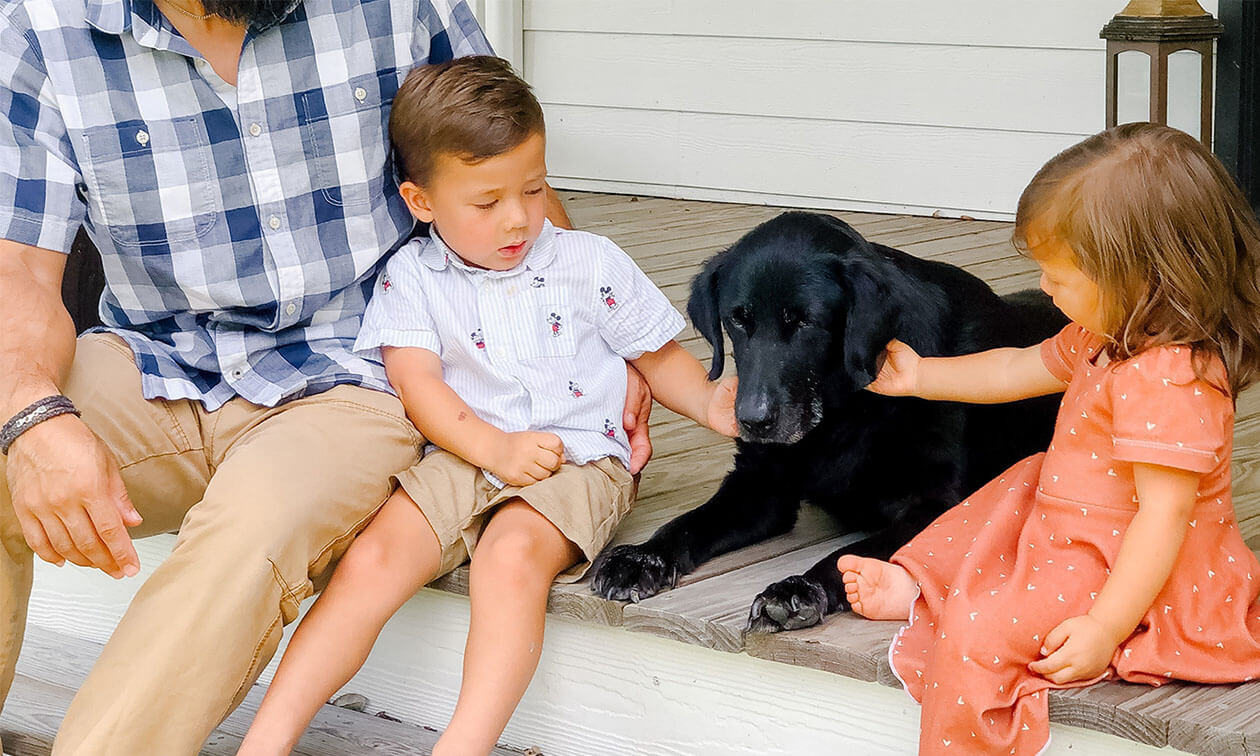When it comes to our four-legged friends, it's hard not to appreciate the friendly nature of dogs. Whether you're an avid dog lover or just looking for a family companion, understanding which breeds tend to be the friendliest can help guide your search for the perfect match.
It's important to remember that any dog breed can be friendly, and any dog breed can bite. A dog's specific genetics, temperament, early socialization, environment, and internal factors (such as health) contribute to behavior. Every dog is unique in how friendly they are with people or with other pets, and their tolerance for different interactions can change day to day based on how they are feeling or recent experiences.
Friendliest Large Dog Breeds
If you are looking for a large dog, look for breeds that are bred to assist people. Due to their close working relationship with humans, they have evolved to be incredibly sociable and eager to please.
Labrador Retriever
Known for their affectionate nature and often called the friendliest dogs, Labrador Retrievers of every color can make excellent family pets. They can be quite exuberant and unaware of how large they are, so training is a must.
Golden Retriever
With their tolerant and gentle demeanor, Golden Retrievers are often great with children and other pets. Golden Retrievers are often called "biddable", meaning they are eager to please and easy to train. They love to work with their person, which is why they've been a favorite breed for service dog training programs.
Poodle
They are energetic and intelligent, known for being affectionate and loyal. They have endless energy, so they need to lead an active lifestyle. For this reason, Poodles often do best in families with older children.
Soft Coated Wheaton Terrier
A medium-sized dog, these Terriers are playful, trainable, and can be excellent with families. Soft Coated Wheaton Terriers are intelligent and love to work, so need exercise and mental enrichment to keep them busy.
Bernese Mountain Dog
The Bernese Mountain Dog is a popular choice when looking for a friendly breed. These dogs tend to be quite social and love attention, and their large size makes them an excellent choice for families with active children.
These breeds thrive on social interaction and are generally good-natured. However, keep in mind that individual variations in personality can still exist. Speak to a potential breeder and veterinarian about your needs and expectations, so they can best match a puppy to your family. If adopting, ask about any temperament testing that has been done and if any information is known about the dog's history.
Friendliest Small Dog Breeds
On the other end of the spectrum, we have small dog breeds that were bred specifically for companionship. These dogs are often known for their friendliness and affectionate nature. Due to their small size, they can be perfect companions for people living in the city or apartments and are easy to take traveling.
Cavalier King Charles Spaniel
Cavaliers are famously affectionate and love nothing more than spending time with their owners or getting attention from passers-by. They can make wonderful therapy dogs.
West Highland White Terrier
Another member of the small breed group, the West Highland White Terrier is a great, little dog who loves to entertain. Their affectionate and outgoing personality, combined with their desire to be a part of the family, makes them delightful companions for both individuals and families alike.
Miniature Poodle
These charming pups are not only smaller in size than their standard-size relatives but big on friendliness. Miniature Poodles love to be around people and thrive with attention. They're very intelligent and love to please. These little dogs flourish with fun training activities.
Pembroke & Cardigan Welsh Corgis
Both Cardigans and Pembrokes are known for their friendly temperament and social nature. They are outgoing, playful, and enjoy being around people, making them a delightful companion. Due to their herding breed instincts, they do need consistent and positive training to reduce nipping and barking behavior when they get overly excited.
Beagle
Beagles were developed as pack animals and were bred to work closely with humans in hunts. Over time, this close interaction has shaped their friendly and sociable nature, making them a popular choice for families. They do have quite the voice when excited (which is not something that can be trained out of them) and need regular exercise and mental enrichment to prevent bad habits.
While specific breeds may have certain traits that make them more inclined to be friendly, it's important to remember that each dog has its own personality. Just like humans, dogs are individuals, and their genetics, socialization, and training play a significant role in their behavior. It's crucial to assess each dog's temperament on an individual basis and not rely solely on breed stereotypes.
A person's behavior can have a significant impact on a dog's behavior, too. Even the friendliest dogs can become anxious or even aggressive if they feel threatened or uncomfortable. Having a child approach a dog and grab them or taking their food away is enough to have the friendliest dog get upset. It is critical to teach children the appropriate way to act around dogs no matter how friendly the dog is. It's important to approach any dog with respect, give them the space they need, and observe their body language to ensure that they feel comfortable and secure. By being mindful of our behavior around dogs, we can help them feel safe and secure in our presence.
While certain dog breeds are known for their friendly nature, it's essential to remember that individual dogs of any breed can display varying degrees of friendliness. Always take the time to get to know a dog's personality, provide plenty of socialization and training, and consult with a veterinarian and certified professional trainer for personalized advice. Remember, a friendly dog is not necessarily a bite-free dog. Understanding canine body language is crucial to fostering safe and positive interactions.
ZPC-02711



